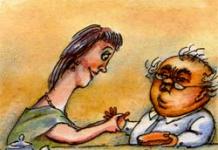What knowledge should you have? modern man V modern world?
Century of development modern technologies takes a number of routine responsibilities off our shoulders. Smart machines come to the rescue. What should a modern person know so as not to turn into a helpless lazy person? Indeed, in the absence of independent decisions in certain life situations, it makes each of us dependent on modern mechanisms.
20 things a modern person should know
Smart gadgets, computers, microwave ovens, washing machines... imagine that all this disappeared. Let's consider what knowledge and skills a modern person should have:
- Making decisions.
- Creative thinking.
- Analytic mind.
- Communication skills.
- Fast adaptability.
- Self-education.
- Memory development.
- Healthy image life.
- Organized.
- Self-development.
- Know how to start a fire.
- Know the basics of geography.
- Use a map and compass.
- Provide first aid.
- Choose quality food.
- Know how to cook food.
- Use a hammer and an axe.
- Fix things.
- Know how to sew.
- Swim.
As you can see, the list consists of two parts.
First part - required skills For personal development, the second is basic life skills. Let's look at each point in more detail.

Skills for human personality development
The development of the following principles will help distinguish successful person from an ordinary individual.
- Making decisions. His future depends on the correctness of the decision that a person chooses in a given life situation. Important aspect– the decision must not only be made, but also implemented.
- Creative thinking. Qualities such as ingenuity and the ability to find new options for solving old problems will force a person to break his deep-rooted stereotypes.
- Analytic mind. Ability to use logic in the comprehensive analysis of specific information. With the development of an analytical mindset, a person is able to find best option solving the problem.
- Communication skills. The art of effective communication between a person and other individuals in society. Good communication skills allow you to successfully interact with the world and be understood by those around you.
- Fast adaptability. Adaptation of a person to established criteria and requirements separate group(for example – school, work team). Thanks to rapid adaptability, a person easily enters new team and adequately navigates the new group.
- Self-education. Self-education allows you to obtain relevant knowledge that a person needs for further personal development. Helps increase intellectual capabilities and expand your social circle.
- Memory development. Good memory, allows you to achieve success in any field of activity. This quality is especially relevant in our information age, associated with huge flows of information.
- Healthy lifestyle. It is impossible to achieve success in life without good health. A healthy lifestyle is not only regular exercise in the morning, but also proper nutrition, regular sleep and maintaining body hygiene.
- Organized. This point includes self-discipline, organization of the day and the ability to accomplish everything planned in advance. Organized person can effectively distribute his forces and ultimately get excellent results.
- Self-development. Constant development is the basis for the success of any person. By improving his skills, a person increases his intellectual potential, personal culture, will and mental capabilities.

Life skills.
Life skills will help you both Everyday life, so in non-standard situation :
- Ability to start a fire. The light and warmth of a fire will help a tourist lost in the forest save his life.
- Know the basics of geography. People will think you are ignorant if you don't know about things outside your country.
- Use a map and compass. If you find yourself in an unknown area, these items will help you find the right path.
- Provide first aid. In order to treat an abrasion or apply a tourniquet to your arm, you do not need to have a medical degree.
- Choose quality food. These skills will help not only when choosing mushrooms and berries in the forest, but will also come in handy when visiting the local supermarket.
- Cook food. Without knowing how to cook simple dishes, such as scrambled eggs, you will sooner or later find yourself in a funny situation.
- Use a hammer and an axe. You don't have to be a carpenter to hammer a nail in a house. Basic to own these simple tools every man should.
- Fix things. The cost of repairing items is at least 30% of the cost of the item itself. If you can do something yourself, you don't have to pay cash
- to the master.
- Swim. The surface of our planet consists of more than 70% water. Agree - this is a powerful argument for learning to swim.

Basic things.
Not only an adult, but also a student should know these things primary classes schools. There are different situations in life when the company talks about basic things, but you don’t understand this issue. For example:
- There are 0.62 miles in one kilometer.
- There are 9 planets in the solar system.
- There are 6 continents on earth.
- The cheetah is the fastest animal.
- There are 251 countries in the world.
- The Sahara is the largest desert.

Comical and interesting facts.
The information can be interesting not only from a scientific point of view, but also contain fun facts:
Here are some of them:
- When eating celery, a person spends more calories than he receives energy from this product.
- An ordinary city dweller spends about six months under a red traffic light.
- If no dye was added to Coke, its color would be green.
- Money is made from cotton, not paper.
- An adult laughs on average 15 times a day. Small child– more than 300.

Now you know exactly what a modern person should know. Of course, this is not the entire list. In order to become an erudite and interesting person for others, you need to read more than one hundred books and popular science articles.
about the knowledge of modern man
1-vopros.ru: a collection of answers to your questions.
More information
The profession of “tester” is one of the most in demand today. And if programming is taught in higher education educational institutions, then testing – unfortunately, no.
But testing can be learned with some effort. Of course, if you have chosen this particular direction of development for yourself.
How to do this, what a tester should know and what qualities a tester should have, we asked a specialist in the field of test management .

Boris has been involved in testing since 2001 and during his time at Luxoft he participated in more than 16 successful projects for various customers as a tester, test designer, and test manager.
Why did you start testing?
Before joining Luxoft, I was a task manager. I had to test the development for compliance with the requirements I had written. So I had some testing experience before Luxoft. But it was more of a kind of spontaneous testing; I simply didn’t know many things. Yes, and previously we (in the Soviet Union) did not have the concept of independent testing, and in Russia it did not appear immediately. In 2001, having arrived at Luxoft, I began to do testing, largely due to circumstances, and I liked it. And so it remained in testing.
How and where did you acquire testing knowledge?
Two decades of compliance testing experience is not bad at all. But at the same time I did not study testing. Actually, they didn’t teach it at that time. I mastered everything only on own experience and the experience of colleagues. I started learning testing at Luxoft. Thank you very much teachers, especially. They provided both theoretical and practical knowledge and recommended literature. I read books on testing (I would especially highlight the book by S. Kaner, D. Faulk, E.K. Nguyen “Testing software"- read like a bestseller).
Is it possible to become a qualified tester only through self-study?
No, I think it’s impossible. You can study on your own theoretical basis testing. But without practice it is dead knowledge. And practice comes only from working on projects, at least educational ones. And it is very important to have an experienced trainer (mentor, curator) who will check, advise and guide.
Often, novice testers, for self-training purposes, use such programs with intentional errors. In your opinion, is this enough? Is it possible to learn how to test software this way?
No you can not. You can learn to find errors in a program on your own, but this does not mean “becoming a tester.” To become a qualified tester, you need to understand the business process for which the product being tested is used. You also need to master test design - you can’t do it from books, without practice. The right way, in my opinion, is this: books, training with an experienced trainer, independent work under supervision (supervision).
What knowledge should a tester have?
This is a very broad question. I will answer quite briefly. I think we can roughly divide necessary knowledge into general and special. General – this is the development methodology software systems; testing methodology in various development models; knowledge of database theory; knowledge of the basics of test automation; knowledge of bug tracking systems; knowledge of the basics of test management; be, at a minimum, a qualified computer user. Special knowledge - depends on the specifics and features of the project: knowledge of various operating systems, knowledge of the tools used.
The tester must also have a thorough knowledge of the development process (including the testing process) used in his organization.
What are the requirements for a tester in your industry?
In addition to general and specialized knowledge, perhaps even first of all, an analytical mindset is required. Based on the requirements and the information that can be obtained from the analyst, the tester must have a good understanding of the business process and must imagine how the end user will work with the product being tested (I’m talking about a qualified tester, of course). If a person is only able to simply check the functionality of the program when entering values into the form fields, then he is not yet a tester, even if he finds all the defects in the form. A tester must be able (and be willing) to quickly learn new tools. A tester must be able to express his thoughts in writing and describe problems. Must be sociable and able to work in a team. And responsible - the tester can find the programmer’s shortcomings, the tester’s shortcomings can only be found by the customer. The tester must be capable of fairly monotonous, routine work. Critical thinking is highly encouraged. And it is important to be able to take criticism.
Share interesting developments with “beginner” testers, give examples from your personal practice.
Here you can either write a lot or write briefly. I prefer the latter J. As a rule, our beginners have no testing experience. In the best case, experience in maintaining or implementing systems (and, as a result, experience in describing problems). Therefore, we start by reading literature on testing and studying company regulations. Along the way - trainings from (if they are in, if not, it happens that I myself conduct them for my own). Then work in educational project(if there is such a possibility - this does not always happen). Then working as an understudy for a more experienced tester. A very good result is obtained when a beginner compiles a summary table of the defects he found and missed, and then in the same table writes his assessment of the reasons why he missed the defect (for each missed defect).
Today there will be a very important article, because in it I want to consider the main vital knowledge, skills, abilities, which, in my opinion, every modern person should have. That is, something that will directly contribute to any business.
Now the world It is completely different from what it was 30, 20 and even 10 years ago, therefore the knowledge, skills, and abilities necessary to live in it are also different.
The modern world does not stand still - it is developing rapidly. Therefore, in order to live well in these rapidly changing conditions, a person must also develop at the same pace. If its development lags behind, or does not exist at all, this will mean moving backward relative to the environmental conditions moving forward. Thus, the knowledge, skills and abilities of a person in the modern world must not only be appropriate to the times, but also constantly develop and improve.
What, first of all, does a person need in current conditions in order to live a normal, fulfilling life? The answer is banal and simple: money! It is money that plays the most important role in the life of absolutely any person: in fact, the achievement of almost any life goals directly or indirectly depends on money. And, more often than not, in the most direct way. To eat - a person needs money to eat quality products- need to more money to dress - you need money, to raise children - you need money to relax - you need money to buy, build or even rent much-needed housing - you need money again.
We don’t have communism, where in theory all this could be free, but capitalism (from the word “capital”). That is, even the name of the social system in which we live seems to hint at what is the fundamental factor for life in it.
Thus, all the key knowledge, abilities, skills necessary for life in the modern world are in one way or another connected with the “extraction” of the resource that underlies it - money.
What knowledge, skills, and abilities are needed to make money? Previously, everything was simple: for this it was necessary to get an education and get a job. Those who did not have an education also got a job and earned a little less. But in any case, everyone had enough money to live normally.
Now everything has changed radically. Firstly, having an education does not guarantee having a job, and, moreover, it does not guarantee having a job with good earnings, sufficient for life. Many studies show that very few people are satisfied with their jobs and wages, believe that their salary is enough to live on. And the vast majority, even working, actually live in poverty (and many even in huge debts!).
Secondly, getting an education itself is now very expensive. And if we consider education as an investment, then its “payback period” often exceeds the period of study, that is, it ranges from 5 years and above. While people who did not go to study, but began to earn money by opening their own business, by this moment already have many times higher earnings. Therefore, the question about the need to obtain higher education can no longer be answered as unequivocally as 30 years ago: everything flows, everything changes.
And thirdly, due to the rapidly changing situation in any field of activity, higher education will in no way be able to provide the knowledge that you will use to earn money for the rest of your life. On the contrary, as practice shows, it provides knowledge that is no longer relevant. At best, they have been out of date for 5 years, and at worst, 20 years. The education system, unfortunately, really doesn’t keep up with the changing world, so in life, at best, 10% of what you were taught at the institute will be useful to you, but it is more likely that nothing will be useful at all (it all depends on the specialty). But you will have a diploma, without which, as many believe, “you’re nowhere now”...
IN modern conditions Our education does not provide the knowledge, skills and abilities that a person needs in life. Often he receives knowledge that he cannot apply anywhere else due to its irrelevance, and therefore quickly forgets.
However, it cannot be said that obtaining an education is completely unnecessary. It gives some important skills (not knowledge, but skills!), and I will mention this a little later. The main conclusion I want to draw from all this is the following:
Since education practically does not give a person the vital knowledge, skills, and abilities, a person can only obtain them independently - through self-education.
Moreover, in many cases this can be done completely free of charge, or, in any case, not for such a huge amount of money, which would cost to study at the institute. And there will be much more benefits.
Well, now let’s move on to the most important thing: what knowledge, skills, and abilities are vital in the modern world?
1. Working at the computer. The richest man of our time, according to Bill Gates, said at the end of the last century: “Whoever masters perfectly by email– will become a millionaire in the 21st century.” Of course, he is right, if you do not take this quote literally. In our era, computer technologies are used literally everywhere, so it will be very difficult to achieve success in anything without sufficient and up-to-date knowledge, skills, and computer skills.
2. Communication skills. In the modern world, it is extremely difficult and almost impossible to achieve any life goals alone. You constantly have to communicate with other people: employers, subordinates, colleagues, partners, clients, officials, etc. And the success of the business you are involved in largely depends on how competently and effectively this communication takes place. Including . Therefore, well-developed communication skills and abilities can be considered vital.
3. Self-development. To achieve success in any business, you need to be an individual, that is, stand out from total mass people, have some kind of individual knowledge, skills, abilities. To do this, you need to practice: set goals for yourself, strive to achieve them, conduct introspection and improve yourself in all directions.
4. Financial literacy. As you remember, money is one of the most important factors in achieving any goal. Therefore, every person should be financially literate: know how to make money correctly different ways, how to spend it correctly, how to take it into account and distribute it, how to save and increase money, that is, everything that the concept includes.
5. Ability to learn. And finally, the most essential skill that I left for last is the ability to learn. It’s not for nothing that I paid so much attention at the beginning of the article to the fact that the modern world is changing and developing very quickly, and any, even the latest knowledge acquired very quickly becomes irrelevant. Based on this, in order to achieve life goals, a modern person must constantly be in the learning process: study new legislation, new work technologies, new opportunities for earning money, etc.
And these are the skills and abilities to learn that can be acquired at an institute, which, in my opinion, is much more important than the knowledge that it gives. Because knowledge will quickly become outdated, but the ability to learn will always be necessary. And this is the benefit that can be derived from receiving higher education today.
I consider these 5 listed skills and abilities to be the main vital ones today. It is their presence and constant development that will help a person earn money - a resource without which it is impossible to provide a decent life for yourself and your loved ones.
And, what is most interesting, you will have to develop this knowledge, skills and abilities mainly on your own, because they will not teach you this anywhere, and even if they teach you, the knowledge will quickly become outdated.
The site is one of those resources that gives you the opportunity to obtain this necessary knowledge and skills completely free of charge. In addition, you can gain and improve knowledge from books, other Internet resources, seminars and trainings. All you need is the desire to develop and action in this direction. Remember that no one will give you this vital knowledge, skills and abilities unless you want to get them yourself.
Therefore, I am always glad to see each of you among the regular readers of the site, active commentators and forum participants. If you have any additions or objections, or your opinion about what knowledge, skills and abilities are vital in the modern world, I will be glad to hear them in the comments. If you find this information useful, share the link with your friends on in social networks and on forums where you communicate. See you again!
The most complete list of theoretical knowledge and practical skills of a clinical (medical) psychologist can be gleaned from the qualification characteristics of a specialist in this field. In accordance with the order of the Ministry of Health of the Russian Federation No. 391 dated November 26, 1996, a medical psychologist is required to have the following knowledge and skills:
Theoretical knowledge
Psychology and its importance for medicine: subject, tasks and interdisciplinary connections of medical psychology, history of the formation of medical psychology as a field of psychological science; medical psychology as a profession; main branches of medical psychology.
Main theoretical and methodological problems of medical psychology: brain and psyche, psychosomatic and somatopsychic relationships. The relationship between the biological and the social, the problem of norm and pathology, genetic and acquired, hereditary and personal-environmental, development and disintegration of the psyche, organic and functional, conscious and unconscious, adaptation and maladaptation, deficient and adaptive.
Systems approach as a theoretical basis for understanding the psychological structure of the disease, restorative treatment and rehabilitation of patients.
Basic (fundamental) medical concepts: etiology, pathogenesis and sanogenesis, symptom, syndrome, clinical diagnosis, functional (multidimensional or multiaxial) diagnosis.
Related knowledge: fundamentals of general and private psychiatry, fundamentals of neurology, the doctrine of borderline mental disorders, self-destructive behavior, fundamentals of psychophysiology and psychopharmacology.
Psychological (psychogenic) factors in the etiology, pathogenesis and pathoplasty of mental and psychosomatic disorders, the concept of pre-illness, mental adaptation disorders, social stress disorders, crisis conditions.
Classification of medical psychology methods, psychological diagnostics as a tool for targeted personality study, methods of psychological diagnostics in the clinic, computer psychodiagnostics, psychological correction.
The concept of psychological diagnosis, functional diagnosis as a result of the integration of clinical, psychological and social aspects of the disease, the concept of psychological contact.
Main categories of medical psychology: mental activity, perception, attention, memory, thinking, intelligence, emotions, will, temperament, character, personality, motivation, needs, stress, frustration, consciousness and self-awareness, self-esteem, conflict, crisis, psychogenesis, psychological defense, coping, alexithymia.
Theory of experiment, concepts of standardized and non-standardized methods, theory and classification of tests, basic psychometric concepts (validity, reliability, standardization, norm, etc.).
Fundamentals of clinical neuropsychology: systemic mechanisms of the brain in the organization of higher mental functions, processes and states, functional specialization of the hemispheres - basic concepts and practice, correlations between general cerebral and local in neuropsychology, nosological specificity of disorders of higher mental functions, specificity of neuropsychological research in childhood; main neuropsychological syndromes and methods of their diagnosis.
Concept of pathopsychology: the relationship between qualitative and quantitative approaches in the analysis of psychodiagnostic data, pathopsychological phenomenology, patterns and structural features of disorders of cognitive processes, properties and conditions caused by the disease, nosological and syndromological specificity of pathopsychological phenomenology, differential diagnostic and expert significance of the pathopsychological experiment, pathopsychological studies in assessing the dynamics of treatment .
Age-related aspects of psychological disorders: age-related characteristics of psychological disorders in various diseases, mental development of an abnormal child, childhood autism, the problem of dysontogenesis and mental retardation, psychological abnormalities of adolescence, characteristics of children and adolescent forms of pathological reaction, psychological aspects of mental infantilism, psychological problems of geriatrics and gerontology.
Teaching about character: concept of accentuation and psychopathy, classification of character accentuations, diagnostic methods.
Doctrine of Personality: basic concepts of personality in domestic and foreign psychology, diagnostic methods, the concept of personality defense mechanisms, personality and illness.
Basic concepts of psychosomatic relationships. Psychosomatic and somatopsychic. The internal picture of the disease and attitude towards the disease, methodology and research methods, nosological specificity of psychological phenomena and the internal picture of the disease. Theoretical and methodological aspects, methods of psychological diagnostics in various types of examination.
Theoretical, methodological and methodological approaches in solving problems of psychoprophylaxis and psychohygiene, the concept of mass research, psychological screening, risk factors, mental maladaptation and illness.
Rehabilitation approach in medicine: concept, concepts, basic principles, forms and methods.
Psychology of extreme and crisis conditions, the concept of traumatic stress, social frustration and social stress disorders.
Basic principles of psychological support of the treatment process: organization of a psychotherapeutic environment in medical units. Relationships between doctor and patient, psychologist and doctor and treatment room, etc.
Psychological aspects of drug and non-drug therapy, placebo effect, psychological problems of preparing patients for surgery, prosthetics, psychological problems of the chronically ill, disabled and dying.
Medical and psychological aspects of social behavior: communication, role behavior, interaction in groups, social normativity, etc.
Features of the work of medical psychologists in inpatient, outpatient and preventive institutions of various types, psychological counseling, vocational selection, career guidance.
Psychological foundations of psychotherapy, restorative training and rehabilitation.
Basic psychotherapeutic theories: psychodynamic, behavioral, existential-humanistic; person-oriented psychotherapy; medical and psychological models of psychotherapy; main forms of psychotherapy: individual group, family, environmental therapy, psychotherapeutic community, sociotherapy; mechanisms of therapeutic action of psychotherapy; nosological specificity and age-related aspects of psychotherapy and psychological counseling; psychological problems of non-verbal methods of psychotherapy: music therapy, choreotherapy, art therapy, etc.
Psychotherapy and psychological counseling in crisis situations.
Legal aspects activities of medical psychologists.
Deontological aspects behavior of a medical psychologist.
Practical skills
The practical skills and abilities of a medical psychologist must provide a qualified professional solution to problems in the field of psychodiagnostics (including expert), psychocorrection and psychological counseling.
In the field of psychodiagnostics:
Ability to conduct a psychological examination taking into account nosological and age specificities, as well as in connection with the tasks of medical and psychological examination; creating the necessary psychological contact and adequate ongoing control of psychological distance; planning and organizing research; selection of an adequate methodological apparatus; ability to carry out quantitative and qualitative analysis of research results in connection with various purposes: differential diagnosis, analysis of the severity of the condition, assessment of the effectiveness of therapy, etc., mastery of basic interpretive schemes and approaches, adequate presentation of available data in a psychodiagnostic report, mastery of basic clinical and psychological methods (psychological conversation, collection of psychological history, psychological analysis of biography, natural experiment);
Mastery of basic experimental psychological techniques aimed at studying mental functions, processes and states: perception, attention, memory, thinking, intelligence, emotional-volitional sphere, temperament, character, personality, motivational characteristics and needs, self-awareness and interpersonal relationships;
Knowledge of basic techniques of neuropsychological research (methods for assessing the state of gnosis, praxis, speech functions, etc.);
Knowledge of the basics of computer diagnostics.
In the field of psychological counseling and the use of psychocorrectional methods:
The use of basic methods of psychological correction (individual, family, group) in working with patients and psychological counseling, taking into account nosological and age specificities;
Knowledge of methods of individual, group and family counseling of healthy people, taking into account age specifics in connection with the tasks of psychoprophylaxis;
Knowledge of basic techniques of restorative training;
Knowledge of approaches to organizing a psychotherapeutic environment and a psychotherapeutic community;
- possession of skills in conducting personal and professionally oriented trainings.
Thus, a clinical psychologist can help both sick and healthy people in solving psychological problems
Ethics in clinical psychology. http://bookap.info/genpsy/clinpsy/gl23.shtm
The professional activity of a clinical psychologist is integrated into all major areas of medical science and practice. The origins of clinical psychology and its development as a specialty are inextricably linked with medicine, especially with psychiatry and psychotherapy. Therefore, turning to the ethical aspects of this relatively young specialty, one cannot help but dwell on modern models of medical ethics.
For more than 25 centuries, various moral principles and rules that accompanied the centuries-old existence of medicine were formed and changed in European culture. Various moral regulators that functioned at different stages of the development of society - religious, cultural, ethnic, socio-economic - influenced the formation of ethical models in medicine. Taking into account the diversity of medical moral experience, we can distinguish 4 coexisting models:
1. Hippocratic model (the principle of “do no harm”).
2. Paracelsus model (the principle of “do good”).
3. Deontological model (the principle of “observance of duty”).
4. Bioethics (the principle of “respect for the rights and dignity of the individual”).
The historical features and logical foundations of each of the models determined the formation of those moral principles that today constitute the value-normative content of modern biomedical ethics.
Hippocratic model. The first form of medical ethics were the moral principles of healing of Hippocrates (460-377 BC), set out by him in the “Oath”, as well as in the books “On the Law”, “On Doctors”, “On Decent Behavior”, “ Instructions" and others. In ancient cultures - Babylonian, Egyptian, Judean, Persian, Indian, Greek - the ability to heal testified to "divine" chosenness and determined an elite, usually priestly, position in society. It is believed that Hippocrates was the son of one of the priests of the god Asclepius - Heraclides, who gave him his initial medical education. The formation of secular medicine in Ancient Greece is associated with the principles of democracy of city-states, and the sanctified rights of healing priests were inevitably replaced by moral professional guarantees and obligations of healers to the suffering. In addition, the ethics of Hippocrates, which is well illustrated by the “Oath,” were caused by the need to dissociate themselves from single doctors, various charlatans, of whom there were many in those days, and to ensure public trust in the doctors of a certain school or corporation of Asclepiads.
The practical attitude of a doctor towards a sick and healthy person, initially focused on care, help, and support, is the main feature of professional medical ethics. That part of medical ethics that examines the problem of the relationship between doctor and patient from an angle social guarantees and professional obligations of the medical community, can be called the “Hippocratic model”. It was about obligations to teachers, colleagues and students, about guarantees of non-harm ("I will direct the treatment of the sick to their benefit in accordance with my strength and my understanding, refraining from all harm and injustice"), providing assistance, showing respect, about negative attitude to murder and euthanasia (“I will not give any lethal means asked of me and will not show the way for such a plan”), abortion (“I will not give any woman an abortifacient pessary”), about the refusal of intimate relations with patients (“In whatever I will not enter a house, I will enter there for the benefit of the patient, being far from everything intentional, unrighteous and harmful, especially from love affairs with women and men, free and slaves." "The doctor has many relationships with the sick: after all, they put themselves at the disposal of doctors, and doctors at all times deal with women, with girls and with property of a very high value, therefore, in relation to all this, the doctor must be abstinent"), about medical confidentiality ("Whatever during treatment - and also without treatment, I I have never heard anything concerning human life that should never be disclosed, I will keep silent about it, considering such things a secret."
Fundamental among the listed principles for the Hippocratic model is the principle of “do no harm,” which focuses on the civil creed of the medical class. This principle forms the initial professional guarantee, which can be considered as a condition and basis for its recognition by society as a whole and by each person individually who trusts the doctor with their health and life. Hippocrates paid great attention to the appearance of the doctor, not only moral, but also external (clothing, neatness) respectability, which was associated with the need to build trust in those turning to the medical caste during the transition from priestly to secular medicine. Priests, throughout the history of the development of religion, acquired the status of those close to the gods; it was believed that they received wisdom and instructions, knowledge and skills from them. Doctors who overcame sanctification were supposed to acquire and possess such qualities that would contribute to the formation of the appearance of the entire medical professional community of that time. Hippocrates defined these qualities based on the generalized values of Ancient Greece. The book “On Decent Behavior” most fully reflects the idea of the ideal of a doctor that developed in the depths of medical schools during the era of the Greek “enlightenment”: “What are they like? appearance, these are in reality: the physician-philosopher is equal to God."
Hippocrates defined the general rules for interaction between a doctor and a patient, with emphasis placed on the doctor’s behavior at the patient’s bedside. When contacting the patient, a form of communication was proposed that would contribute to the patient’s orientation towards recovery: “An obvious and great proof of the existence of art will be if someone, while establishing the correct treatment, does not cease to encourage the sick so that they are not too worried in spirit, trying to bring time closer to themselves.” recovery."
An important and ethically complex issue was the remuneration of the doctor for the care and treatment provided. In conditions of priestly medicine, gifts and offerings were given not to the priest himself, but to the temple in which he served. During the transition to secular medicine, when the fee was provided directly by the doctor, appropriate rules were needed that did not violate the general architectonics of medical ethics: “It is better to reproach those who are saved than to rob those in danger in advance.”
Paracelsus' model. The second historical form of medical ethics was the understanding of the relationship between doctor and patient, which developed in the Middle Ages. Paracelsus (1493-1541) was able to express it especially clearly. This form of medical ethics, within the framework of which moral relations with the patient are understood as a component of the doctor’s therapeutic behavior strategy. If in the Hippocratic model social trust of the patient’s personality is won, then the “Paracelsus model” is a consideration of the individual characteristics of the individual, recognition of the depth of his emotional contacts with the doctor and the inclusion of these contacts in the treatment process. “In Paracelsus we see the founder not only in the field of creating chemical drugs, but also in the field of empirical mental treatment” (Jung). Within the boundaries of the “Paracelsus model”, paternalism as a type of relationship between doctor and patient is fully developed. Medical culture uses the Latin concept of pater - “father”, which Christianity extends not only to the priest, but also to God. The meaning of the word “father” in paternalism states that the “model” of connections between a doctor and a patient is not only consanguineous relationships, which are characterized by positive psycho-emotional attachments and socio-moral responsibility, but also the “healing”, “divinity” of the very contact between the doctor and the patient . It is not surprising that the main moral principle that is formed within the boundaries of this model is the principle of “do good,” goodness, or “do love,” beneficence, mercy. Healing is the organized implementation of good. Paracelsus wrote: “The power of a doctor is in his heart, his work must be guided by God and illuminated by natural light and experience; the most important basis of medicine is love.” Under the influence of Christian anthropology, Paracelsus viewed the physical body of man “only as a house in which the true man, the builder of this house, dwells.” It is believed that the Christian understanding of the soul contributed to the development of suggestive therapy, which was actively used by the outstanding physician of the 16th century. Cardano, considering it as a necessary and effective component of any therapeutic effect. Cardano understood the role of the trust factor and argued that the success of treatment is largely determined by the patient’s faith in the doctor: “He who believes more is cured better.” The importance of a trusting relationship between doctor and patient was repeatedly emphasized by outstanding doctors of the past, back in the 8th century. Abul-Faraj wrote: “There are three of us - you, the disease and me; if you are with the disease, there will be two of you, I will remain alone - you will defeat me; if you are with me, there will be two of us, the disease will remain alone - we We will defeat her."
At the end of the 19th - beginning of the 20th centuries. Freud desacralized paternalism, stating the libidinal nature of the relationship between doctor and patient. His concepts of transference and countertransference are a means of theoretical understanding of the complex interpersonal relationship between doctor and patient in psychotherapeutic practice. Freud believed that every psychotherapist, and the work of a doctor of any specialty includes a psychotherapeutic component, “must be impeccable, especially in moral terms.” Freud wrote not only about “impeccability” as a theoretically verified strategy of therapeutic behavior based on the peculiarities of the nature of therapeutic activity, but also “impeccability” as an almost mechanical accuracy of compliance of the doctor’s behavior with certain standards of ethical requirements.
Deontological model. The term “deontology” (“deontos” - due, “logos” - doctrine) was first introduced by the English philosopher Bentham (1748-1832), denoting with this concept the science of duty, moral obligation, moral perfection and impeccability. Deontology is especially important in those professional activities where complex interpersonal influences and responsible interactions are widely used. In medicine, this is the compliance of the doctor’s behavior with certain ethical standards. This is the deontological level of medical ethics, or the “deontological model”, based on the principle of “compliance with duty”. The basis of deontology is to treat a patient in the same way as you would like to be treated in a similar situation. The deep essence of the deontology of healing is revealed by the symbolic statement of a Dutch doctor of the 17th century. van Tul-Psi: “By shining for others, I burn myself.”
The term “deontology” was introduced into Soviet medical science in the 40s of the 20th century. Petrov to designate a real-life area of medical practice - medical ethics - which was “abolished” in Russia after the 1917 revolution for its connection with religious culture. The deontological model of medical ethics is a set of “should” rules (measurement, compliance with the “should” and evaluation of actions not only by results, but also by thoughts), corresponding to one or another specific area of medical practice. Deontology includes issues of maintaining medical confidentiality, measures of responsibility for the life and health of patients, problems of relationships in the medical community, relationships with patients and their relatives. Thus, an example of this model is the rules regarding intimate relationships between a doctor and a patient, developed by the Committee on Ethical and legal issues at the American Medical Association (JAMA, 1992, No. 2):
Intimate contacts between doctor and patient that occur during treatment are immoral;
An intimate relationship with a former patient may be considered unethical in certain situations;
The issue of intimate doctor-patient relationships should be included in the training of all health care professionals;
Doctors must always report violations of medical ethics by their colleagues.
To “observe duty” means to fulfill certain requirements. An improper act is one that contradicts the requirements imposed on the doctor by the medical community, society, one’s own will and mind. When the rules of conduct are open and precisely formulated for each medical specialty, the principle of "compliance with duty" recognizes no excuses for evading its fulfillment. The idea of duty is the determining, necessary and sufficient basis for the doctor’s actions. If a person is able to act according to the unconditional requirement of “duty,” then such a person corresponds to his chosen profession; if not, then he must leave this professional community.
Sets of “precisely formulated rules of conduct” have been developed for almost every medical specialty and represent a list and characteristics of these rules for all medical areas. By the middle of the 20th century. medical deontology becomes international - international documents regulating the behavior of a doctor appear: the Declaration of Geneva (1948), the International Code of Medical Ethics (London, 1949), the Declaration of Helsinki (1964), the Tokyo Declaration (1975), etc.
Bioethics. In the 60-70s. XX century A new model of medical ethics is being formed, which considers medicine in the context of human rights. The term "bioethics" (ethics of life), which was proposed by Van Renseller Potter in 1969, which is defined as "the systematic study of human behavior in the field of life and health sciences, to the extent that this behavior is considered in the light of moral values and principles ". The main moral principle of bioethics becomes the principle of “respect for the rights and dignity of the individual.” Under the influence of this principle, the solution to the “main issue” of medical ethics is changing - the issue of the relationship between the doctor and the patient. Today, the issue of patient participation in medical decision-making is acute. This far from “secondary” participation takes shape in new types of relationship between doctor and patient - informational, deliberative, interpretative types are in their own way a form of protection of human rights and dignity. In modern medicine, they discuss not only helping the patient, but also the possibilities of controlling the processes of pathology, conception and dying, with very problematic physical and metaphysical (moral) consequences of this for the human population as a whole. Medicine, working today at the molecular level, is becoming more “predictive.” Dausset (a French immunologist and geneticist) believes that predictive medicine "will help make a person's life long, happy and free of disease." Only one “but” stands in the way of this bright prospect: “a person or group of persons driven by a thirst for power and often infected with totalitarian ideology.” Predictive medicine can also be defined as non-subjective, impersonal, that is, capable of diagnosing without subjective indicators, complaints and the patient. And this is truly a real and unprecedented lever of control and power over both an individual human organism and the human population as a whole.
Bioethics is a modern form of traditional professional biomedical ethics, in which the regulation of human relations is subordinated to the overriding task of preserving the life of the human race. Regulating relationships with the ultimate task of preserving life is directly related to the very essence and purpose of morality in general. Today, the “ethical” becomes a form of protection of the “natural-biological” from the excessive claims of culture to its natural foundations. Bioethics (ethics of life) as a specific form of the “ethical” arises from the need of nature to protect itself from the power of culture in the face of its extreme claims to transform and change the “natural-biological”.
Since the 60-70s. XX century, as an alternative to paternalism, the autonomous model, when the patient reserves the right to make decisions related to his health and medical treatment, is becoming increasingly widespread. In this case, the doctor and patient jointly develop a strategy and treatment methods. The physician applies his or her medical expertise and provides explanations regarding treatment prognoses, including alternatives to no treatment; the patient, knowing his goals and values, determines the option that best suits his interests and plans for the future. Thus, instead of a paternalistic model of protecting and preserving the patient’s life, the principle of the patient’s well-being is currently coming to the fore, which is implemented by the doctrine of informed consent - the patient’s self-determination depends on the degree of his awareness. The doctor is obliged to provide the patient not only with all the information he is interested in, but also with that which, due to his incompetence, the patient may not be aware of. In this case, the patient’s decisions are voluntary and consistent with his own values. From this follows the moral core of the “doctor-patient” relationship in bioethics - the principle of respect for the individual. The question of determining the beginning and end of life also becomes of great importance. The conflict of “rights”, “principles”, “values”, and in essence, human lives and the destinies of culture is a reality modern society. The conflict between the “right of the fetus to life” and the “right of a woman to an abortion”, or the legal consciousness of the patient, rising to the awareness of the “right to a dignified death”, which comes into conflict with the doctor’s right to fulfill not only the professional rule “do no harm”, but also the commandment - "thou shalt not kill." Regarding abortion as the destruction of what can become a person, there are three moral positions: conservative - abortion is always immoral and can only be permitted if the woman’s life is at risk; liberal - moderate - a woman’s absolute right to an abortion, regardless of the age of the fetus; and moderate - justification for abortion before a certain development of the embryo (until the stage of the developing fetus - 12 weeks, when brain tissue becomes electrically active).
Brain activity also serves as a criterion for death. Modern intensive care can support the lives of patients who are unable to breathe independently or think. Therefore, new moral problems arise related to patients who are on the verge of life and death. The question of euthanasia usually arises when the patient has become irreversibly unconscious; when dying, he experiences intense unbearable suffering, forcing doctors to support the patient in a semi-conscious state or when the newborn has anatomical and physiological defects incompatible with life. There is a wide range of opinions: from the complete legalization of the doctor’s right to terminate the life of a patient with his consent (“active euthanasia”), to the complete rejection of euthanasia as an act contrary to human morality. There is a variant of the so-called “passive euthanasia”, when the principle of non-treatment is used, excluding the act of killing itself (switching off artificial systems that ensure life activity, stopping the administration of medications, etc.).
The ethical issues of abortion and euthanasia are related to the moral aspects of reproduction and transplantation. Modern technology of life reproduction defines qualitatively new forms of relationships between spouses, parents and children, biological and social parents. Transplantology opens up new problems of determining the line between life and death due to the moral alternative of saving the life of the recipient and responsibility for the possible murder of a doomed donor.
In the 90s XX century bioethics has become a concept that includes the entire set of socio-ethical problems of modern medicine, among which one of the leading ones is the problem of social protection of the human right not only to self-determination, but also to life. Bioethics plays an important role in shaping society's respect for human rights.
Yudin believes that “bioethics should be understood not only as a field of knowledge, but also as an emerging social institution of modern society.” A specific form of resolving possible contradictions in the field of biomedicine are bioethical public organizations (ethical committees), uniting doctors, lawyers, bioethicists, priests, etc., ensuring the development of recommendations on specific problem situations of medical and biological activity, be it its theoretical or practical side .
A historical and logical analysis of the development of healing ethics leads to the following conclusion. The modern form of medical ethics is biomedical ethics, which now works in the mode of all four historical models - the model of Hippocrates and Paracelsus, the deontological model and bioethics. The connection between scientific and practical activity and morality is one of the conditions for the existence and survival of modern civilization.
Modern clinical psychology in all its sections is based on general medical ethical principles. At the same time, a clinical psychologist in his work is faced with specific ethical issues.
Firstly, this is the question of the need to inform the subject about the purposes and content of a psychological examination before conducting it. A clinical psychologist is obliged to maintain confidentiality when discussing the results of a study, obtain the patient’s consent if it is advisable for other specialists other than the attending physician to familiarize themselves with the results, and be correct when conducting the study or in case of refusal.
Secondly, the rule of “boundaries” (the boundary as the limit of acceptable behavior) must be observed. Taking into account the specifics of interpersonal interaction between a clinical psychologist and a patient, it is necessary to clearly define the professional boundaries of communication during psychological counseling and during psychotherapeutic meetings, since “crossing” the boundary can lead to the destruction of the treatment process and cause harm to the patient. The range of violations of the boundaries of professional interaction is very wide: from sexual contact with a patient to advice, recommendations and questions that go beyond the scope of therapeutic contact. For example, during an appointment, a patient’s condition worsened, and he was provided with the necessary medical care. Worried about what happened, the psychologist calls him at home in the evening to find out about his health. The patient considered this a violation of “boundaries” and an encroachment on his autonomy (autonomy is defined as “personal freedom” or as the “principle of free expression of will”). However, under certain circumstances, “violating boundaries” can be constructive, so taking into account the context of interaction is important here. Thus, a patient, having entered the office of a clinical psychologist and reported the death of her son, leans towards the psychologist’s chest and the latter responds to this impulse of hers, thereby expressing sympathy for the patient’s grief. Failure to show empathy in such situations is likely to alienate the patient and interrupt interpersonal interaction. “Violation of boundaries” also occurs when they try to use the patient for personal purposes of a non-sexual nature.
Thirdly, the formation of a patient’s emotional attachment to a clinical psychologist, which is one of the characteristics of professional interpersonal interaction, may be a complex ethical issue. This form of attachment is often the basis for containing the affective disturbances that accompany the disease. However, attachment, turning into dependence, causes negative reactions in the patient, leading to destructive forms of behavior. Therefore, the clinical psychologist must carefully monitor the interaction with the patient, being aware of his professional actions, so that emotional support does not interfere with providing the patient with the means to independently cope with difficulties and realize his life goals.
It must be emphasized that interest in bioethics in recent decades will urgently require further development of the ethical foundations of modern clinical psychology.
Subject and structure of clinical psychology. Definitions of clinical psychologyhttp:// rudocs. exdat. com/ docs/ index-445265. html? page=2
Clinical psychology is a broad-based specialty that is interdisciplinary in nature and involved in solving a set of problems; health care system, public education and social assistance to the population. Object clinical psychology is a person with difficulties of adaptation and self-realization associated with his physical, social and spiritual condition. Clinical psychology is a branch of psychology subject the studies of which are:
disorders (disorders) of the psyche and behavior;
personal and behavioral characteristics of people suffering from various diseases;
the impact of psychological factors on the occurrence, development and treatment of diseases;
features of the relationship between sick people and the social microenvironment in which they find themselves.
In a broader sense, clinical psychology can be understood as the application of the entire body of psychological knowledge to solving a wide variety of issues and problems arising in medical practice. In a narrower sense, clinical psychology is a special methodology of psychological research, which is based on the method of observing a relatively small number of patients in natural conditions and subsequent subjective analysis and interpretation of individual manifestations of their psyche and personality. In this sense, clinical-psychological methodology is fundamentally opposed to the natural science experimental approach, which is based on the criteria of “objective” (statistically reliable) psychological knowledge. Clinical psychology refers to an interdisciplinary field of scientific knowledge and practical activity in which the interests of doctors and psychologists intersect. Based on the problems that this discipline resolves (the mutual influence of the mental and somatic in the occurrence, course and treatment of diseases), and the practical tasks that are set before it (diagnosis of mental disorders, differentiation of individual psychological characteristics and mental disorders, analysis of the conditions and factors for the occurrence of disorders and diseases, psychoprophylaxis, psychotherapy, psychosocial rehabilitation of patients, protection and maintenance of health), then it is a branch of medical science. However, based on theoretical premises and research methods, this is a psychological science. Modern clinical psychology as a discipline that studies various mental and behavioral disorders using psychological methods can be used not only in medicine, but also in various educational, social and advisory institutions serving people with developmental anomalies and psychological problems. In pedagogical practice, clinical and psychological knowledge makes it possible to timely recognize mental developmental disorders or deviations in behavior in a child, which in turn makes it possible to selectively and effectively use adequate educational technologies in relationships with him, psychological and pedagogical correction and the creation of optimal conditions for the development of his personality taking into account individual characteristics. As an independent branch of psychological science in relation to pedagogical practice, modern clinical psychology has the following tasks:
studying the influence of psychological and psychosocial factors on the development of behavioral and personality disorders in a child, their prevention and correction;
studying the influence of deviations and disorders in mental and somatic development on the child’s personality and behavior;
studying the specifics and nature of mental development disorders in a child;
studying the nature of the relationship of an anomalous child with his immediate environment;
development of principles and methods of clinical and psychological research for pedagogical purposes;
creation and study of psychological methods of influencing the child’s psyche for corrective and preventive purposes.
^ Main sections clinical psychology are: pathopsychology, neuropsychology and psychosomatic medicine. In addition, it often includes such special sections as psychotherapy, rehabilitation, psychohygiene and psychoprophylaxis, psychology of deviant behavior, psychology of borderline mental disorders (neurosology). The number of special sections is constantly increasing depending on the needs of society. And today one can find such particular areas of clinical psychology as the psychology of post-traumatic stress, psychology of disability, psychovenerology, psycho-oncology, social psychology of health, etc. Clinical psychology is closely related to such disciplines as psychiatry, psychopathology, neurology, psychopharmacology, physiology of higher nervous activity, psychophysiology, valeology, general psychology, psychodiagnostics, special psychology and pedagogy. The area of intersection of scientific and practical interest of clinical psychology and psychiatry is diagnosis. Let us remember that historically clinical psychology originated in the depths of psychiatry as an auxiliary diagnostic tool. The psychiatrist places the main emphasis on recognizing pathological organic processes that cause mental disorders, as well as on the pharmacological impact on these processes and on preventing their occurrence. Psychiatry pays little attention to how mental processes occur normally in healthy people. The process of diagnosing mental disorders, on the one hand, involves the separation of the actual disorders caused by organic disorders and individual personality characteristics, and on the other hand, the diagnosis of mental disorders requires confirmation of the presence of actual psychological disorders in a person, which is done with the help of pathopsychological and neuropsychological experiments, and also through various psychological tests (tests). The overlapping subject of psychiatry and clinical psychology is mental disorders. However, clinical psychology also deals with disorders that are not diseases (so-called “borderline mental disorders”). In fact, modern psychiatry and clinical psychology differ not in the subject, but in the point of view on the same subject: psychiatry focuses on the morpho-functional (somatic) side of a mental disorder, while clinical psychology focuses on the specifics of the psychological reality that arises in mental disorders . The connection between clinical psychology and neurology is manifested in the concept of psychoneural parallelism: each event in the mental sphere necessarily corresponds to a separate event at the level of the nervous system (not only central, but also peripheral). There is even a separate interdisciplinary field of medicine – psychoneurology. The connection between clinical psychology and psychopharmacology lies in the latter’s study of the psychological effects of drugs. This also includes the problem of the placebo effect when developing new medicinal compounds. The connection of clinical psychology with the physiology of higher nervous activity and psychophysiology is manifested in the search for correlations between pathopsychological processes and their physiological correlates. The connection between clinical psychology and valeopsychology and mental hygiene lies in the joint determination of factors that oppose the emergence of mental and somatic disorders and the clarification of mental health criteria. The connection between clinical psychology and special psychology and pedagogy is manifested in the search for ways to correct problematic behavior in children and adolescents caused by mental functioning disorders or anomalies of personal development. ^ Methodological principles of clinical psychology. Methodology is a system of principles and methods of organizing and constructing theoretical and practical activities, united by the doctrine of this system. It has different levels: philosophical, general scientific, specific scientific, which are interconnected and should be considered systematically. Methodology is closely related to worldview, since its system presupposes a worldview interpretation of the foundations of the study and its results. The methodology of clinical psychology itself is determined by the specific scientific level and is associated with the ideological position of the researcher (for example, focused on a dynamic, cognitive-behavioral, humanistic or dialectical-materialistic understanding of personality, behavior, psychopathology). The methodology includes specific scientific research techniques: observation, experiment, modeling, etc. They, in turn, are implemented in special procedures - methods for obtaining scientific data. As a psychological discipline, clinical psychology is based on the methodology and methods of general psychology. Methods, that is, ways of cognition, are the ways by which the subject of science is learned. Psychology, every science, applies a system of particular methods or techniques. The main requirement of scientific methodology, formulated by Hegel, is that research must reflect its subject in its internal logic. He demanded that the method be inseparable from the subject and its content. Methodology in psychology is implemented through the following provisions (principles).
The psyche and consciousness are studied in the unity of internal and external manifestations.
The solution to a psychophysical problem asserts the unity, but not the identity, of the mental and the physical, therefore psychological research presupposes and often includes a physiological analysis of psychological (psychophysiological) processes.
The methodology of psychological research should be based on a socio-historical analysis of human activity.
The goal of psychological research should be to reveal specific psychological patterns (the principle of individualization of research).
Psychological patterns are revealed in the process of development (genetic principle).
The principle of pedagogization of the psychological study of the child. It does not mean giving up experimental research in favor of pedagogical practice, but the inclusion of the principles of pedagogical work in the experiment itself.
The use of products of activity in the methodology of psychological research, since they materialize the conscious activity of a person (the principle of studying a specific person in a specific situation).

























